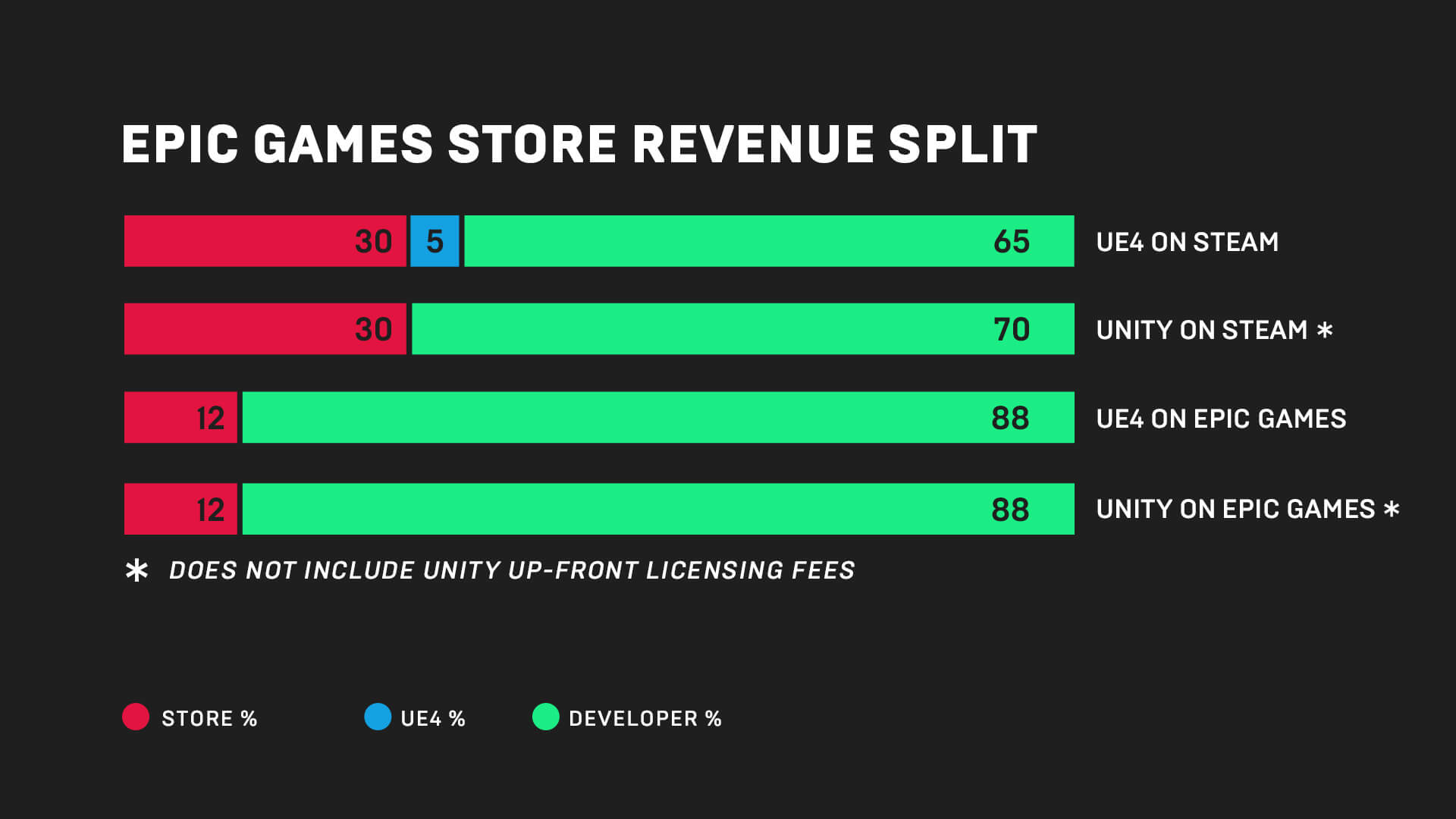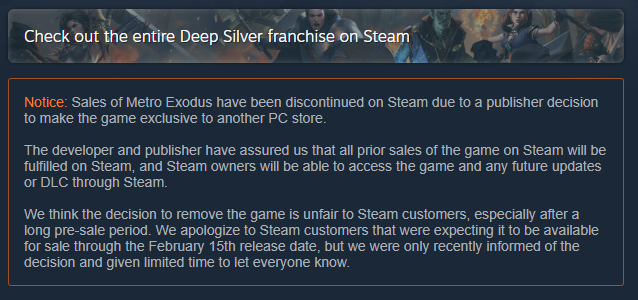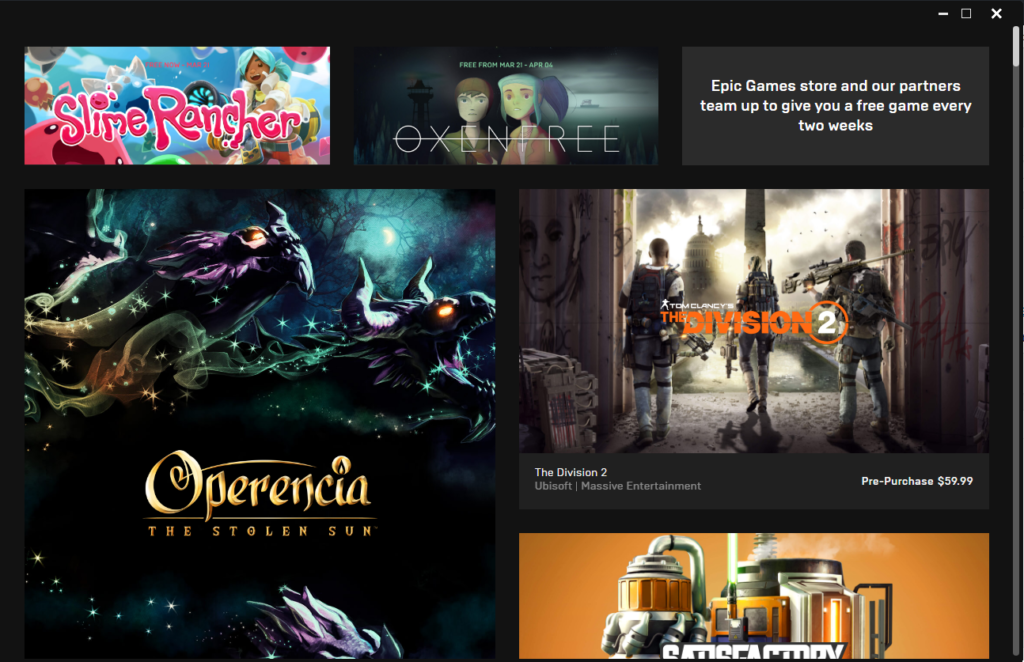In late 2018, after an amazingly successful year for their flagship title, Fortnite, Epic Games announced it would put some of its newly-acquired capital toward supercharging its proprietary games launcher. Previously a platform for first-party titles exclusively, the freshly-renamed Epic Games Store is now one of the top contenders in a party looking to dethrone Steam, Valve’s industry kingpin. While Epic is far from the first company to take aim at Steam, its strategy so far appears to be one of more direct competition than usual. Where EA before them introduced Origin to claim a deeper portion of proprietary profits, Epic’s strategy seems to be aimed less at maximizing income from first-party titles and more toward creating and maintaining a digital storefront for external developers. The company’s announcement of this new direction came with a promise of a 12% price cut on titles sold from the store, significantly lower than Steam’s current figure of 30%. In the weeks following this announcement, press and industry response was generally positive, but Epic’s strategy has since evolved, and the company’s effort to attract developers is more complex than a singular price incentive.

While part of Epic’s business strategy for their storefront is attracting and convincing developers to offer their games on the platform, the studio has also begun to tie up exclusivity agreements with a small group of developers of varying sizes. While not at all new in gaming at large, where console exclusives have existed since time immemorial and are almost wholly responsible for fueling the greatest of console wars, non-first party exclusivity on PC platforms is rare and unusual. Gamers can expect EA to lock their first-party titles behind Origin’s gates, and for Valve, Blizzard, and now Epic to do the same. Additionally, it’s not uncommon for a title to be sold exclusively through Steam, with no interest paid to secondary digital storefronts. What’s unique about Epic’s situation here is that it really seems clear that their strategy isn’t to compete with Steam with prices alone, but also on the infrequently-touched front of second-party availability.
In December, Kotaku reported that the Epic store had also locked down limited exclusivity with several titles, including Supergiant’s Hades and Super Meat Boy Forever. That same month, Coffee Stain Studios, of Goat Simulator fame, made some waves with fans when they removed their upcoming title, Satisfactory from Steam’s store page in favor of a new exclusivity agreement with Epic. While response to Coffee Stain’s decision was relatively quiet and largely limited to the studio’s dedicated fanbase, the situation repeated itself on a larger scale when publisher Deep Silver removed the upcoming Metro Exodus from the Steam store, despite already having been available for preorder for several months. In the week since, the studio sent a response to their decision to Ars Technica wherein CEO Klemens Kundratitz promised that all outstanding Steam preorders for the game would be fulfilled, though its $60 Steam price point has since been supplanted by a $50 offering on the Epic Store. In a response to the action, Valve called the decision to delist the game unfair, and the overall experience has led some to accuse Epic of purposefully poaching titles already available on Steam.

After the Metro incident, Steam users took to the platform to review-bomb the series’ previous titles. Review-bombing is a real problem on Steam, but Valve has stepped forward recently in introducing the timeline feature to show when positive and negative reviews were posted, allowing store browsers to see trends and sudden changes in review habits. In contrast, Epic’s purported solution to this problem is to allow game developers to disable reviews entirely, an action beneficial to their bottom line but inarguably anti-consumer.
Having taken a new look at the Epic Games store, it may be necessary now to reevaluate our collective expectations of the platform and its coming development. To this end, we should evaluate both of the store’s purported faces: a boon to developers and a necessary competitor to Steam. Where developers are concerned, the advantages of the Epic store seem pretty clear-cut: if you offer your games here, you’ll get to keep more of the profits. It’s a model that’s smart for developers, smart for Epic, and a neutral choice for consumers. As a competitor to Steam, though, all signs point to “too early to call”. While Epic has displayed a willingness to play on the pro-consumer side by offering an early lineup of free games (and thereby introduced me to the joy that is Subnautica), it’s hard to tell whether this is a move indicative of an overarching strategy or a short-term project meant to expand the platform’s userbase.

Overall, it’s important for me to note one thing: if the Epic Store doesn’t end up being necessarily better than the Steam storefront, that doesn’t automatically make it a worse alternative. In fairness, the platform doesn’t even really need to be outwardly pro-consumer for the positive effects of competition to take hold. We shouldn’t hold up Epic as a beacon of competition for doing the bare minimum, but it’s also hard to hold their feet to the fire for the ways the Epic Store is at-par with Steam. We’re left, I think, with a simple conclusion: wait and see. As long as Epic continues to rake in Fortnite money, the Epic Store will have plenty of time to develop. Maybe Epic’s attempts at garnering market share will fail, and its platform will become another glorified proprietary launcher. Maybe the stage is being set for a paradigm shift in PC gaming, and this new platform is built for industrial dominance. Maybe, most likely, it’ll be something in between. For now, though, I’ll wait and see.
